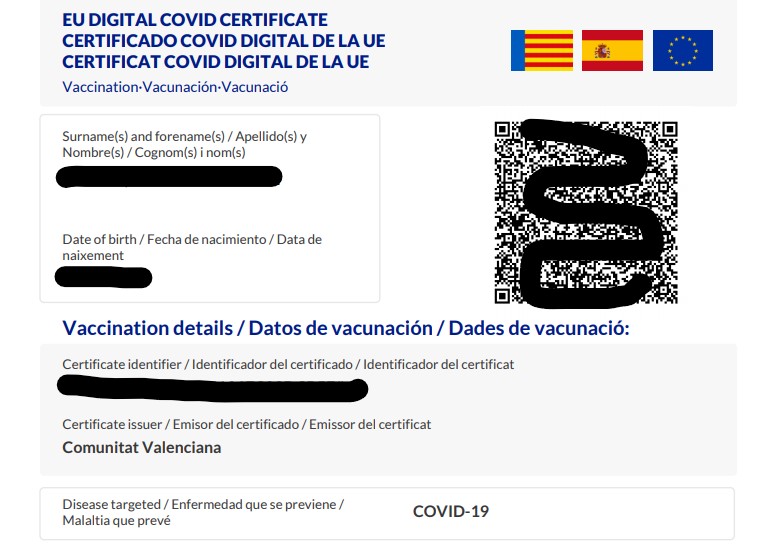Puig announces that a COVID passport will be required to enter bars and restaurants in Valencian region
The measure needs to be endorsed by the regional Supreme Court of Justice but, if approved, it will be implemented by the December “puente” weekend.

Thursday 25th November 2021 – MIKE SMITH
The president of the Generalitat Valenciana, Ximo Puig, has announced that, subject to approval by the Supreme Court of Justice, a COVID passport will be required to enter bars, restaurants and leisure venues across the Comunidad Valenciana from next weekend. The measure will remain in place over the Christmas holidays.
The president announced the measure after a meeting of the Interdepartmental Commission for the Prevention and Action against COVID-19 which was called to analyze the details of the implementation of a COVID passport. He said that “the vaccination has given us good results but we must now react to the increase in new cases” and added that receiving the vaccine reduces the potential of the virus to spread easily.
Whilst the regional government has approved a mandatory COVID passport, the decision still need to be endorsed by the Supreme Court of Justice in order for the measure to be implemented before the December “puente” next weekend and, once approved, it will remain in place for at least 30 days.
The passport (certificate) provides proof that the bearer has been either fully vaccinated, has tested negative via PCR in the previous 72 hours or antigen test in the previous 48 hours, or has fully recovered from the disease in the previous six months.
The main business associations in the region have expressed their support for the measure, recognising that, in the face of rising cases, the alternative is to impose capacity and opening restrictions.
If it is endorsed, the COVID passport will be required in the following:
- Bar and restaurants with a capacity of more than 50 people, except on outside terraces.
- Leisure and entertainment venues.
- Recreation activity venues.
- Hospitals for visitors.
- Public and Private Residences for visitors.
- Venues holding events, celebrations, music festivals and others when it is not feasible to wear a mask at all times (indoors and outdoors).
An APP will be provided to the hospitality sector, including nightlife venues, for access control and the president made assurances that no data will be stored. The COVID passport will need to be shown at the entrance to the venue together with an photo ID such as the DNI or passport.
According to the latest information provided by the regional health authorities, the data for 66 municipalities in the Comunidad Valenciana places them in the Extreme Risk category for the spread of the coronavirus whilst a further 60 municipalities are in the High risk category. The latest 14-day IA rate for the Comunidad Valenciana is now 150.16 and it has doubled in the past fortnight.
According to the president, around 300,000 registered residents of the Comunidad Valenciana have yet to be vaccinated against COVID-19. The president added that the region is prepared for the vaccination of children under the age of 12 if necessary. This week, the European Medicines Agency (EMA) approved the use of COVID-19 vaccines on the under 12s.
A COVID passport is now mandatory for access to certain sectors such as nightlife and restaurants in the Balearic Islands, Galicia and Catalonia. The courts have rejected similar requests in Navarra, Aragón, La Rioja and the País Vasco, regions where the 14-day IA rate, the measure of how effectively the virus is spreading through the population, is well above the national rate of 148.84.
The president said that he was confident that there was “sufficient argument” for the endorsement of the implementation of a COVID passport by the Supreme Court but added that his government would abide by whatever decision is made, and if it is rejected, then the Generalitat would seek other options – a “Plan B” – to guarantee the safety of its citizens.




